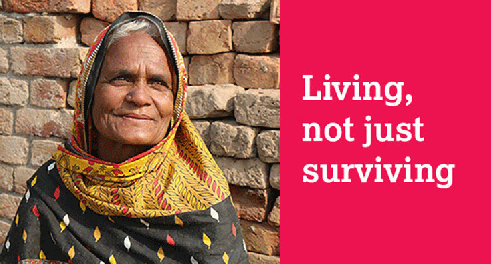
By Bridget Sleap
Life is about more than just surviving. This is the main message from older people in a new HelpAge International report.
Living, not just surviving, brings together findings from a consultation with 539 older people from 23 countries to find out their perspectives on social protection and social security, life long education and lifelong learning in advance of the 10th session of the UN Open-ended Working Group on Ageing.
Social protection and social security
The report found that many older people on a pension are unable to afford basic necessities, such as food, water, clothing, housing, medical care, and care and support they need to survive. Such low pensions deny older people’s autonomy and freedom to live their lives on their own terms.
Often older people have to rely on others including their spouses, children or other family members to survive, with many participants telling HelpAge International that they have no control over how they spend their pension and have been subjected to theft, threating behaviour, intimidation and fraud. When pensions are low and choice over how to spend them is limited, many older people feel there is nothing meaningful to make decisions about.
This is the situation for 74-year-old Safwan, who despite having two degrees and having spent his life in full time work, still can’t afford vital medical care. “I can’t afford to go to the doctor or the dentist. Half of my teeth are missing, and I can’t hear properly in my right ear. Sometimes I can’t even afford my daughter’s medication or taking her to the doctor”. You can read his full story here.
Education and life-long learning
Older people say their lives are also limited because they do not have the skills, knowledge and information they need. Without these older people feel excluded from society and dependent on others. As a 75-year-old woman from Nepal said. “Before, I had some skills but most of the those are irrelevant today.”
Older people interviewed wanted to aquire new skills, knowledge and information for their daily lives, including literacy, numeracy and IT skills for staying in touch and accessing essential services. They wanted to develop new skills to earn a living, manage their finances, start a business or set up an organisation.
However, accessibility of information, availability and affordability of courses and ageism were some of the barriers identified that prevented older people from acquiring new skills, knowledge and information.
‘I’d like to have writing and reading lessons. I tried but they said it could be hard for me because of my age.’ 60-year-old woman, Rwanda.
10th session of the Open-ended Working group on Ageing
Older people’s rights to social protection and social security and to education and lifelong learning will be discussed by governments, human rights institutions, civil society organisations and older people themselves at the next session of the Open-ended Working Group on Ageing in New York will be held from 15 to 18 April 2019.
International human rights law currently fails to adequately cover the unique barriers that older people face to these rights. To address this, how both rights apply to older people and the particular context of older age needs to be clearly set out and guaranteed in a new UN convention on the rights of older people.
A clearly defined set of international human rights standards would promote older people’s dignity, autonomy and independence and ensure that life in older age is about more than just surviving.
Download Living, not just surviving and our ‘Time to Act’ guide to discover how you can support us in our campaign for a UN convention on the rights of older people.
You can also find out more about a UN Convention on the rights of older people here.
